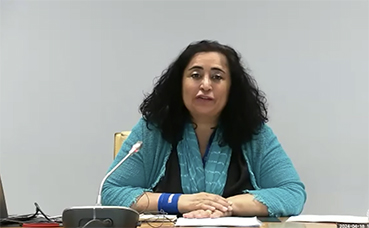On April 18, 2024, the International Labour Organization (ILO) and the UN Inter-Agency Task Force on Social and Solidarity Economy (UNTFSSE) hosted an anniversary webinar on the adoption of the UN General Assembly Resolution promoting the Social and Solidarity Economy (SSE) for sustainable development. The event featured regional updates and reflections and attracted nearly 400 registrants from 65 countries. Accessibility in French, English, and Spanish ensured inclusivity for a diverse audience.
The event kicked off with a welcome statement from Ms Simel Esim, Head of Cooperative, Social and Solidarity Economy at the ILO and Co-Chair of the UNTFSSE. “Each region brings its unique insights and challenges, enriching our dialogue and enhancing our understanding of how to effectively promote sustainable development across different contexts,” Ms Esim stated. She underscored the past year’s key achievements for the UNTFSSE and the ILO in follow-up to the ILC resolution concerning decent work and the SSE. She notably highlighted the online self-learning modules for awareness raising on the SSE, developed for the UNTFSSE by the ILO and its International Training Centre in Turin, with support from the Government of Luxembourg.
Ms Chantal Line Carpentier, Head of Trade, Environment, Climate Change, and Sustainable Development at UN Trade and Development and Co-Chair of the UNTFSSE, presented a summary of the UNTFSSE’s Strategic Action Plan for 2024-2026. She noted that the plan prioritizes implementing the UN resolution, preparing the UN Secretary General’s report, institutionalizing Task Force governance, and promoting key areas such as policy coherence, education and research, access to financial and non-financial support services, and statistics. Linking the SSE to a new economics for sustainable development she noted: “We see a lot of regional progress, and we need to make sure it goes global, and it goes national, and it goes local. And all of this we can do with our partners at all the levels, but it will require some resources.”
Regional Level Highlights
The webinar showcased updates from various regions, beginning with two video messages from Spain and Chile, two co-sponsors of the UNGA resolution, that highlighted the launch of the Ibero-American Network for the Promotion of the SSE. On the Iberian side, Ms Amparo Merino, Secretary of State for the Social Economy from Spain’s Ministry of Labour and Social Economy, praised the resolution as “a true example of international cooperation in these times in which conflict and international disorder seem to prevail.” On the Americas side, Ms Claudia Fuentes Julio, Permanent Representative of Chile to the United Nations Office at Geneva, stated: “Our commitment to social justice is at the heart of our efforts to promote the SSE. This dedication transcends borders as demonstrated by the participation of more than a dozen governments of the Americas in the ILO Global Coalition for Social Justice.”
Following these two video messages, Mr Patrick Klein, Head of Sector for Social Economy and Social Enterprise, and Ms Margit Perko, Policy Officer at the Directorate-General for Employment, Social Affairs and Inclusion, both representatives of the European Commission, discussed the implementation of the Social Economy Action Plan. Mr Klein underlined the importance of supporting “social economy actors to be a beacon in the green transition [and] the digital transition.” Ms Perko presented highlights of progress, such as the adoption of the Council Recommendation on developing social economy framework conditions and the launch of the EU Social Economy Gateway.
Participants then heard from Mr Sabelo Mbokazi, Head of Labour, Employment, and Migration Division at the African Union (AU) Commission. He discussed the AU’s engagement with the SSE, including the development, with ILO support, of a ten-year SSE Strategy and mapping studies to inform policy making. The strategy is set to be endorsed by Ministers responsible for Social Development, Labour, and Employment at the end of July in 2024. “The strides made so far,” he noted, “stand as a testament to the transformative potential of SSE in advancing socio-economic progress across the Continent.”
And lastly, Mr Denison Jayasooria, Former Chair of the Asian Solidarity Economy Council (ASEC) and Head of Secretariat, All Party Parliamentary Group Malaysia on SDGs, shared the perspective of SSE actors in Asia and the Pacific, in the absence of an intergovernmental regional initiative on the SSE. Mr Jayasooria emphasized the vibrancy of the SSE movement in the region as “an alternative model of doing business and development towards a more sustainable, inclusive, and just development.”
Participant Reflections & Re-Commitment
The presentations sparked a period of reflection among designated participants, including representatives from the Ministry of Microfinance and the Social and Solidarity Economy of the Government of Senegal, the Organisation for Economic Co-operation and Development (OECD), Global Social Economy Forum, SSE International Forum and CIRIEC.
Joining the ILO’s Global Social Justice Coalition was emphasized as a key opportunity to promote the SSE. Looking ahead, upcoming milestones include the UN Summit of the Future, the Second World Summit for Social Development, and the second UN International Year of Cooperatives in 2025.
A video recording of the event is available here.







